-
Positivity Project at Weatherstone Elementary
In spring 2018, Weatherstone started implementing The Positivity Project as a way to support students in their social-emotional learning and growth. We believe that #PositivityinAction is important and strive to support students in strengthening relationships and pro-social skills so that they can be successful, happy, collaborative, creative, critical-thinkers and problem-solvers.

The Problem
The research is clear. Our ability to build strong relationships is under assault.
Narcissism and Empathy
Between the early 1980s and late 2000s, narcissism in college freshmen increased by 30% and empathy decreased by 40%, according to separate studies from San Diego State University and the University of Michigan.
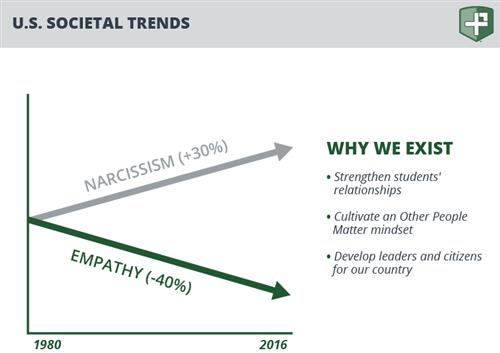
Achievement vs Caring
A 2014 study from the Harvard Graduate School of Education asked middle and high school students to rank what was most important to them: achieving at a high level, happiness (feeling good most of the time), or caring for others. Almost 80% of students picked high achievement or happiness. Revealingly, students were 3x more likely to agree than disagree with this statement: “My parents are prouder if I get good grades in school than if I’m a caring member of my community and school.” And, only 15% of students saw “promoting caring in students” as their teachers’ top priority.

Loneliness
Between 1985 and 2004, Americans’ number of close friends or people that they could “discuss important matters with” dropped from 2.94 to 2.08. People who said they had no one to discuss important matters with more than doubled, to nearly 25 percent.

Why are relationships so important?
Strong relationships are the cornerstone of health, happiness, and resilience…and jobs of the future.Heath & Happiness
Harvard University has a nearly 80-year ongoing study that followed 724 men, from two different socioeconomic cohorts, across their lifespans to track health and well-being. The director, Dr. Robert Waldinger, summarized their findings: “The lessons aren’t about wealth or fame or working harder and harder. The clearest message that we get from this study is this: Good relationships keep us happier and healthier. Period.”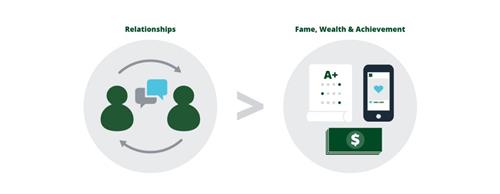 Harvard University Study on Adult Development
Harvard University Study on Adult DevelopmentResilence
The National Scientific Council on the Developing Child (NSCDC) at Harvard University had a simple question: Why do some children do well and show resilience, despite exposure to stressful circumstances and hardship? Their answer: “Resilience requires relationships, not rugged individualism…The single most common finding is that children who end up doing well have had at least one stable and committed relationship with a supportive parent, caregiver, or other adult.”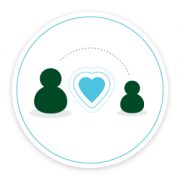
Jobs
Researchers at Oxford University estimate that 47% of U.S. jobs are at “high risk” for being automated within the next 10-20 years. Research out of MIT reinforces these findings, forecasting that technology’s impact on employment “will only accelerate.” The MIT researchers predict the following skills will be in the highest demand as we move into the future: persuasion, negotiation, and group dynamics; framing and solving open-ended problems; applied math and statistics; sound writing; and human interaction and nurturing.
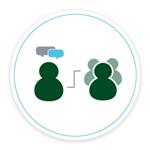


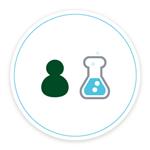

Our Solution
Only by consistently teaching our youth about the character strengths that everyone possesses, will they see the people based on the content of their character.
This ability will enhance our student's self-awareness and self-confidence, understanding and appreciation of others, and interpersonal relationships – which will positively influence our youth (individually and collectively) across their lifespans.
The Positivity Project Model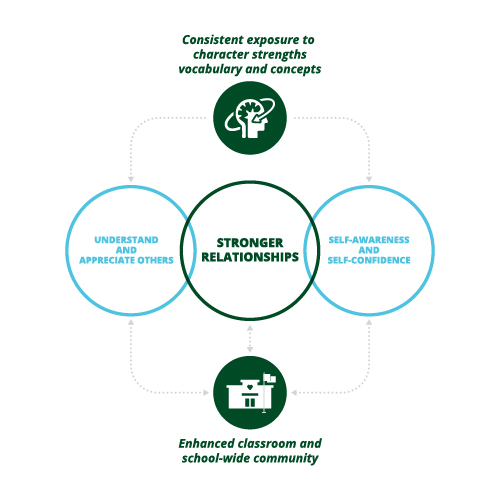
Select a School...
Select a School
- Abbotts Creek Elementary School
- Adams Elementary School
- Alston Ridge Elementary School
- Alston Ridge Middle School
- Apex Elementary School
- Apex Friendship Elementary School
- Apex Friendship High School
- Apex Friendship Middle School
- Apex High School
- Apex Middle School
- Athens Drive Magnet High School
- Aversboro Elementary School
- Back to School 2020-21
- Baileywick Road Elementary School
- Ballentine Elementary School
- Banks Road Elementary School
- Barton Pond Elementary School
- Barwell Road Elementary School
- Baucom Elementary School
- Beaverdam Elementary School
- Brassfield Elementary School
- Brentwood Magnet Elementary School
- Briarcliff Elementary School
- Bridges Program
- Brier Creek Elementary School
- Brooks Magnet Elementary School
- Broughton Magnet High School
- Bryan Road Elementary School
- Buckhorn Creek Elementary School
- Bugg Magnet Elementary School
- Carnage Magnet Middle School
- Carpenter Elementary School
- Carroll Magnet Middle School
- Carver Elementary School
- Cary Elementary School
- Cary High School
- Cedar Fork Elementary School
- Centennial Campus Magnet Middle School
- Combs Magnet Elementary School
- Conn Magnet Elementary School
- Connections Academy Middle School
- Creech Road Elementary School
- Crossroads FLEX High School
- Davis Drive Elementary School
- Davis Drive Middle School
- Dillard Drive Magnet Elementary School
- Dillard Drive Magnet Middle School
- Douglas Magnet Elementary School
- Durant Road Elementary School
- Durant Road Middle School
- East Cary Magnet Middle School
- East Garner Elementary School
- East Garner Magnet Middle School
- East Millbrook Magnet Middle School
- East Wake High School
- Enloe Magnet High School
- Farmington Woods Magnet Elementary School
- Forest Pines Drive Elementary School
- Forestville Road Elementary School
- Fox Road Magnet Elementary School
- Fuller Magnet Elementary School
- Fuquay-Varina Elementary School
- Fuquay-Varina High School
- Fuquay-Varina Middle School
- Garner Magnet High School
- Graduation 2021
- Green Hope Elementary School
- Green Hope High School
- Green Level High School
- Green Magnet Elementary School
- Guides to Technology
- Harris Creek Elementary School
- Herbert Akins Road Elementary School
- Herbert Akins Middle School
- Heritage Elementary School
- Heritage High School
- Heritage Middle School
- Highcroft Drive Elementary School
- Hilburn Academy
- Hodge Road Magnet Elementary School
- Holly Grove Elementary School
- Holly Grove Middle School
- Holly Ridge Elementary School
- Holly Ridge Middle School
- Holly Springs Elementary School
- Holly Springs High School
- Hortons Creek Elementary School
- Hunter Magnet Elementary School
- Jeffreys Grove Magnet Elementary School
- Jones Dairy Elementary School
- Joyner Magnet Elementary School
- Kingswood Magnet Elementary School
- Knightdale Elementary School
- Knightdale High School
- Lacy Elementary School
- Lake Myra Elementary School
- Laurel Park Elementary School
- Lead Mine Elementary School
- Leesville Road Elementary School
- Leesville Road High School
- Leesville Road Middle School
- Ligon Magnet Middle School
- Lincoln Heights Magnet Elementary School
- Lockhart Elementary School
- Longview School
- Lufkin Road Middle School
- Lynn Road Elementary School
- Martin Magnet Middle School
- Middle Creek Elementary School
- Middle Creek High School
- Millbrook Magnet Elementary School
- Millbrook Magnet High School
- Mills Park Elementary School
- Mills Park Middle School
- Moore Square Magnet Middle School
- Morrisville Elementary School
- Mount Vernon Middle School
- Neuse River Middle School
- Early Learning Center at Memory Road
- North Forest Pines Elementary School
- North Garner Middle School
- North Ridge Elementary School
- North Wake College & Career Academy
- Northwoods Elementary School
- Oak Grove Elementary School
- Oakview Elementary School
- Oberlin Magnet Middle School
- Olds Elementary School
- Olive Chapel Elementary School
- Panther Creek High School
- Parkside Elementary School
- Partnership Elementary School
- Penny Road Elementary School
- Phillips High School
- Pine Hollow Middle School
- Pleasant Grove Elementary School
- Pleasant Union Elementary School
- Poe Magnet Elementary School
- Powell Magnet Elementary School
- Project Enlightenment
- Rand Road Elementary School
- Reedy Creek Elementary School
- Reedy Creek Magnet Middle School Center for the Digital Sciences
- Richland Creek Elementary School
- River Bend Elementary School
- River Bend Middle School
- River Oaks Middle School
- Rogers Lane Elementary School
- Rolesville Elementary School
- Rolesville High School
- Rolesville Middle School
- Root Elementary School
- Salem Elementary School
- Salem Middle School
- Sanderson High School
- Sanford Creek Elementary School
- SCORE Academy
- Scotts Ridge Elementary School
- Smith Magnet Elementary School
- South Garner High School
- South Lakes Elementary School
- Southeast Raleigh Elementary School
- Southeast Raleigh Magnet High School
- Stough Magnet Elementary School
- Swift Creek Elementary School
- Sycamore Creek Elementary School
- Timber Drive Elementary School
- Turner Creek Elementary School
- Underwood Magnet Elementary School
- Vance Elementary School
- Vandora Springs Elementary School
- Vernon Malone College & Career Academy
- Virtual Academy Orientation
- Wake Early College of Health and Sciences
- Wake Early College of Information and Biotechnologies
- Wake Forest High School
- Wake Forest iSTEM Magnet Elementary School
- Wake Forest Middle School
- Wake STEM Early College High School
- Wake Young Men's Leadership Academy
- Wake Young Women's Leadership Academy
- Wakefield Elementary School
- Wakefield High School
- Wakefield Middle School
- Wakelon Elementary School
- Walnut Creek Elementary School
- Washington Magnet Elementary School
- Weatherstone Elementary School
- Wendell Elementary School
- Wendell Middle School
- West Cary Middle School
- West Lake Elementary School
- West Lake Middle School
- West Millbrook Middle School
- White Oak Elementary School
- Wilburn Elementary School
- Wildwood Forest Elementary School
- Wiley Magnet Elementary School
- Willow Spring High School
- Willow Springs Elementary School
- Woods Creek Elementary School
- Yates Mill Elementary School
- York Elementary School
- Zebulon Magnet Elementary School
- Zebulon Magnet Middle School


